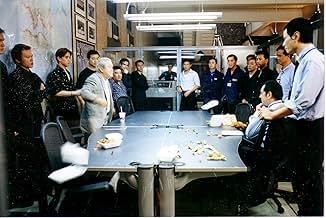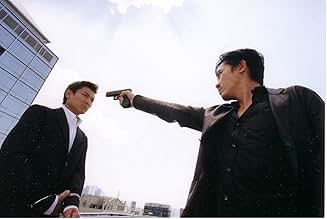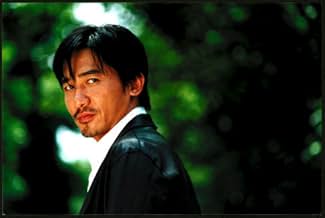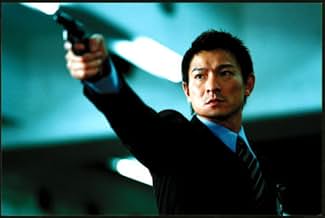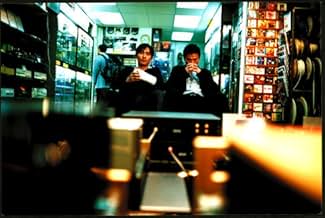La historia de un topo del departamento de policía y un agente encubierto. Comparten el mismo objetivo: descubrir al topo y al policía.La historia de un topo del departamento de policía y un agente encubierto. Comparten el mismo objetivo: descubrir al topo y al policía.La historia de un topo del departamento de policía y un agente encubierto. Comparten el mismo objetivo: descubrir al topo y al policía.
- Dirección
- Guión
- Reparto principal
- Premios
- 24 premios y 26 nominaciones en total
Tony Leung Chiu-wai
- Chen Wing Yan
- (as Tony Leung)
Anthony Chau-Sang Wong
- SP Wong Chi Shing
- (as Anthony Wong)
Ka-Tung Lam
- Inspector B
- (as Lam Ka Tung)
Ting Yip Ng
- Inspector Cheung
- (as Ng Ting Yip)
Chi-Keung Wan
- Officer Leung
- (as Wan Chi Keung)
Kam Fung Hui
- Cadet School Principal
- (as Hui Kam Fung)
Reseñas destacadas
A seriously refreshing police thriller that cranks up the tension to the max. There's no overblown gunplay or buddy cop crap here, this baby is tight as a drum and will have your nails down to the quick. Superb performances, a tight script and tense direction make this a winner in every department. Pick it up if you can, it's fantastic.
9/10
Niz
9/10
Niz
Martin Scorsese's 'The Departed' was probably one of the most critically-acclaimed films of 2006, and, upon hearing the tumult of praise that accompanied its release, it was a film that I desperately wanted to see. However, I couldn't do so until I had seen the 2002 Hong Kong film upon which it was based, 'Mou gaan dou {Infernal Affairs},' directed by Wai-keung Lau and Siu Fai Mak. Fortunately, not too long ago, my local movie rental store was having a sale on their superfluous VHS tapes, at a price of $2.00 apiece. Among the cheap movies that I snapped up was a copy of 'Infernal Affairs' that looked like it had never been opened. Having now watched it, I must say that, despite my limited experience with Asian cinema, I very much enjoyed the film. 'Infernal Affairs' combines an irresistible story of intrigue, loyalty and betrayal with some extremely slick editing and camera-work; it's no surprise that the film has acquired an impressive following in the West.
Tony Leung plays Chan Wing Yan, an overwrought undercover cop who has spent the last ten years infiltrating numerous dangerous gangs and exposing their criminal dealings. On the opposite end of the spectrum, Andy Lau plays Inspector Lau Kin Ming, a police mole who is secretly working the Triad, the same gang with which Yan is currently affiliated. After an expensive drugs transaction goes wrong for both the gang and the police force, each side suspects that they have a traitor in their midst, and, in a bitterly ironic turn, it falls to each of the two moles to find out who it is. Both main actors do a good job of maintaining the intensity of the story. There are certainly countless parallels to be drawn between the characters, but what struck me most were the contrasts between the two: Ming is a cold, devoted and ruthlessly efficient, whilst Yan has been reduced to a tired and neurotic wreck after a decade of living in fear.
The plot of 'Infernal Affairs' moves forward at a ripper pace, probably owing more to Western action cinema than that from its own region. The cinematography is bright and stylish, and the climactic scene on the rooftop, with the vibrant sunlight beaming overhead, was captured to great effect {Australian-born Christopher Doyle, who has worked on such films as '2046' and 'Rabbit-Proof Fence,' contributed to this film, so you already know that the cinematography will be good}. There are several moments when the storytelling was not handled as well as it might have been: the film made too frequent use of unnecessary flashbacks, and, following the death of Superintendent Wong (Anthony Wong), we are treated to a video montage that feels like the final episode of a long-running sitcom. Also, the failed attempts of Ming's wife to finish her novel ("I don't know whether he's good or bad") was a blatantly-obvious attempt to draw parallels with Andy Lau's character. Despite my trivial complaints, 'Infernal Affairs' is an entertaining and thrilling film that I'd certainly recommend to anyone.
Tony Leung plays Chan Wing Yan, an overwrought undercover cop who has spent the last ten years infiltrating numerous dangerous gangs and exposing their criminal dealings. On the opposite end of the spectrum, Andy Lau plays Inspector Lau Kin Ming, a police mole who is secretly working the Triad, the same gang with which Yan is currently affiliated. After an expensive drugs transaction goes wrong for both the gang and the police force, each side suspects that they have a traitor in their midst, and, in a bitterly ironic turn, it falls to each of the two moles to find out who it is. Both main actors do a good job of maintaining the intensity of the story. There are certainly countless parallels to be drawn between the characters, but what struck me most were the contrasts between the two: Ming is a cold, devoted and ruthlessly efficient, whilst Yan has been reduced to a tired and neurotic wreck after a decade of living in fear.
The plot of 'Infernal Affairs' moves forward at a ripper pace, probably owing more to Western action cinema than that from its own region. The cinematography is bright and stylish, and the climactic scene on the rooftop, with the vibrant sunlight beaming overhead, was captured to great effect {Australian-born Christopher Doyle, who has worked on such films as '2046' and 'Rabbit-Proof Fence,' contributed to this film, so you already know that the cinematography will be good}. There are several moments when the storytelling was not handled as well as it might have been: the film made too frequent use of unnecessary flashbacks, and, following the death of Superintendent Wong (Anthony Wong), we are treated to a video montage that feels like the final episode of a long-running sitcom. Also, the failed attempts of Ming's wife to finish her novel ("I don't know whether he's good or bad") was a blatantly-obvious attempt to draw parallels with Andy Lau's character. Despite my trivial complaints, 'Infernal Affairs' is an entertaining and thrilling film that I'd certainly recommend to anyone.
As cadets, Lau and Chan both show promise as police officers. However, Chan is removed from the training and send to be a long-term undercover in Sam's gang. However, unbeknownst to the police, Lau is also a long-term mole who is feeding information back to Sam. When Sam and police chief SP Wong both have their operations scuppered, each realises the other has a mole and sets out to uncover each. With each other's lives at risk, Lau and Chan must be the first to uncover the other.
I decided to see this after hearing good things about it but I was conscious that often foreign films can be given more leniency than Western films doing the same thing. After a slightly confusing opening few moments as characters settle down (not helped by using completely different actors for characters at late teens and late 20's - do people change that much?) the film immediately becomes gripping. The plot may well have the occasional hole and have unnecessary personal details (Lau's girlfriend and Chan's ex weren't really needed) but the central story is well written and told with such urgency that it is hard not to be totally engaged.
The film doesn't have many massive shoot outs or action scenes but it has a pretty consistent sense of tension that is enjoyable right up to a typical but impacting ending. The direction is stylish and only occasionally overuses the slow-mo jump cuts. It may owe more to American cinema than that of the Orient but it is still a very good film and I hope the inevitable remake will be as good.
The cast don't need to do that much apart from look intense and portray the tension of the story in a realistic fashion - something that they do well. At times the lead two actors are pushed out of this by the personal asides but they happily keep things on track. Both Lau and Leung play it very well - it never came down to good guy/bad guy and the audience was pretty well split. Wong is a solid officer while Tsang is good as Sam. Chen and Cheng may not have a great deal to do apart from slowing the film but they both look good doing it.
Overall this is a solidly enjoyable cop thriller, regardless of what country it comes from. It will eventually be remade I imagine and when it is I hope that it manages to retain it's consistent sense of tension, double-edged characters and a real tight hold on it's audience just as this did here.
I decided to see this after hearing good things about it but I was conscious that often foreign films can be given more leniency than Western films doing the same thing. After a slightly confusing opening few moments as characters settle down (not helped by using completely different actors for characters at late teens and late 20's - do people change that much?) the film immediately becomes gripping. The plot may well have the occasional hole and have unnecessary personal details (Lau's girlfriend and Chan's ex weren't really needed) but the central story is well written and told with such urgency that it is hard not to be totally engaged.
The film doesn't have many massive shoot outs or action scenes but it has a pretty consistent sense of tension that is enjoyable right up to a typical but impacting ending. The direction is stylish and only occasionally overuses the slow-mo jump cuts. It may owe more to American cinema than that of the Orient but it is still a very good film and I hope the inevitable remake will be as good.
The cast don't need to do that much apart from look intense and portray the tension of the story in a realistic fashion - something that they do well. At times the lead two actors are pushed out of this by the personal asides but they happily keep things on track. Both Lau and Leung play it very well - it never came down to good guy/bad guy and the audience was pretty well split. Wong is a solid officer while Tsang is good as Sam. Chen and Cheng may not have a great deal to do apart from slowing the film but they both look good doing it.
Overall this is a solidly enjoyable cop thriller, regardless of what country it comes from. It will eventually be remade I imagine and when it is I hope that it manages to retain it's consistent sense of tension, double-edged characters and a real tight hold on it's audience just as this did here.
Beautifully shot, cleverly constructed, humorous, dramatic, and humane. I never felt bored or rushed for a moment. Expect to have to concentrate on who is who, especially at the beginning, who is or might be on to whom and how, and what they might decide to do about it. Others have said that the two leads are excellent and I'm sure they're right, but I especially appreciated Eric Tsang as Sam.
It's elegant without being heartless. I felt the main characters' longing for truth in their lives, and the various different virtues, flaws, loyalties and motivations of many others too.
I was interested to see that virtually all the violence happens off-camera. It reminded me of 'authentic' productions of Classical Greek plays. Their plots often included murders, but violence was not permitted to be shown directly. A character would describe what had happened, and then a tableau of corpses would be revealed, on a wheeled wheels if I remember correctly from one production. Almost the same device is used in this film, and it's very effective when it's done well, as here.
The friend I went with would have liked to the female characters given bigger roles. Personally (I'm a woman myself, if it makes a difference) I don't care about that. I did notice, though, the way the female characters were used as symbols to represent the good and truthful side of life. It struck me, in connection with this, that sex and violence were being treated as opposites, whereas in many US films they are treated almost as two aspects of the same thing and as depending on one another, hardly existing independently. How many plots are driven by the kidnapping or other ill-treatment of the hero's wife/girlfriend/squeeze, so that the violence against her - whether she resists it violently or not - is used to justify and supposedly motivate the whole towering nonsense by virtue of her sexual relationship with the hero? It often seems that the villian's real offence is thought to be less assault on a person, than theft of property. And I wonder if, when the US remake appears, this tedious plot device will have crept in? But I digress - it was just an idea that occurred to me on the way home, and it tells you little about "Infernal Affairs", except that it may be one reason why I found this film refreshing.
An absorbing experience, and has made me more inclined to seek out Asian films in general, as well as films by the same director.
It's elegant without being heartless. I felt the main characters' longing for truth in their lives, and the various different virtues, flaws, loyalties and motivations of many others too.
I was interested to see that virtually all the violence happens off-camera. It reminded me of 'authentic' productions of Classical Greek plays. Their plots often included murders, but violence was not permitted to be shown directly. A character would describe what had happened, and then a tableau of corpses would be revealed, on a wheeled wheels if I remember correctly from one production. Almost the same device is used in this film, and it's very effective when it's done well, as here.
The friend I went with would have liked to the female characters given bigger roles. Personally (I'm a woman myself, if it makes a difference) I don't care about that. I did notice, though, the way the female characters were used as symbols to represent the good and truthful side of life. It struck me, in connection with this, that sex and violence were being treated as opposites, whereas in many US films they are treated almost as two aspects of the same thing and as depending on one another, hardly existing independently. How many plots are driven by the kidnapping or other ill-treatment of the hero's wife/girlfriend/squeeze, so that the violence against her - whether she resists it violently or not - is used to justify and supposedly motivate the whole towering nonsense by virtue of her sexual relationship with the hero? It often seems that the villian's real offence is thought to be less assault on a person, than theft of property. And I wonder if, when the US remake appears, this tedious plot device will have crept in? But I digress - it was just an idea that occurred to me on the way home, and it tells you little about "Infernal Affairs", except that it may be one reason why I found this film refreshing.
An absorbing experience, and has made me more inclined to seek out Asian films in general, as well as films by the same director.
Most western viewers will only know the Asian crime scene from the bleak and lyrical canvas of Takeshi Kitano's work. Here we get something that at first seems far more westernized and very close to the work of one Michael Mann. Okay, enough allusions: yes "Heat" comes heavily to mind at first. but this is no simple "Heat" in Hong Kong. This a splicing of everything Asians do best in a moody, stylish tension-based thriller. From the beautiful cinematography(reminiscent of Wong Kar-Way's films)- step forward visual consultant Christopher Doyle! - and music to the graceful ying-yang undertones (mirror-images are a key theme), the film's most heroic achievement lies in its leads and in the bold ending.
Hearing that this is being considered for a remake stateside comes as no big surprise, but how Matt Damon and Leonardo DiCaprio could possibly compete against Andy Lau and Tony Leung evokes cynicism at best. Both leads are perfect. Lau's cold calculating intellect against Leung's anguished and tormented heart, complimentary opposites. There aren't enough words to commend this fresh, invigorating film with...
Hearing that this is being considered for a remake stateside comes as no big surprise, but how Matt Damon and Leonardo DiCaprio could possibly compete against Andy Lau and Tony Leung evokes cynicism at best. Both leads are perfect. Lau's cold calculating intellect against Leung's anguished and tormented heart, complimentary opposites. There aren't enough words to commend this fresh, invigorating film with...
¿Sabías que...?
- CuriosidadesWhen Yan and SP Wong are waiting at the elevator, the digital floor counter skips the 4th floor. In China and Hong Kong, the number 4 is considered bad luck because it sounds similar to the word 'death'.
- PifiasShawn Yue (Young Chen Wing Yan) is taller than Anthony Chau-Sang Wong (SP Wong Chi Shing), and there is a brief shot of them standing together. Tony Chiu-Wai Leung (Chen Wing Yan) is clearly shorter than Anthony Chau-Sang Wong, so the character has apparently shrunken.
- Citas
Lau Kin Ming: I have no choice before, but now I want to turn over a new leaf.
Chan Wing Yan: Good. Try telling that to the judge; see what he has to say.
Lau Kin Ming: You want me dead?
Chan Wing Yan: Sorry, I'm a cop
Lau Kin Ming: Who knows that?
- Versiones alternativasFor the Chinese version an alternate ("politically correct") ending was used. In it, Lau gets arrested when he leaves the elevator.
- ConexionesEdited into Juego sucio 3 (2003)
- Banda sonoraInfernal Affairs
Composed & Arranged by Ronald Ng
Performed by Andy Lau and Tony Leung Chiu-wai (as Tony Leung)
Produced by Ronald Ng and Kwok-Leung Chan
O.P. BMG Music Publishing Hong Kong, Ltd./Catchy Music Publishing, Ltd.
Selecciones populares
Inicia sesión para calificar y añadir a tu lista para recibir recomendaciones personalizadas
Detalles
- Fecha de lanzamiento
- País de origen
- Sitios oficiales
- Idiomas
- Títulos en diferentes países
- Infernal Affairs
- Localizaciones del rodaje
- Ten Thousand Buddhas Monastery, Sha Tin, New Territories, Hong Kong, China(opening scene: temple)
- Empresas productoras
- Ver más compañías en los créditos en IMDbPro
Taquilla
- Presupuesto
- 6.428.966 US$ (estimación)
- Recaudación en Estados Unidos y Canadá
- 169.659 US$
- Fin de semana de estreno en EE. UU. y Canadá
- 25.680 US$
- 26 sept 2004
- Recaudación en todo el mundo
- 8.836.958 US$
- Duración
- 1h 41min(101 min)
- Color
- Mezcla de sonido
- Relación de aspecto
- 2.35 : 1
Contribuir a esta página
Sugerir un cambio o añadir el contenido que falta





